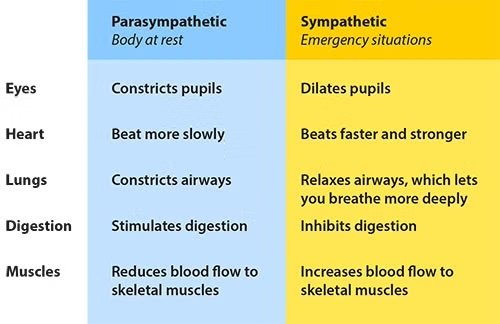What causes the "butterflies in your stomach" feeling?
The short answer
The "butterflies in your stomach" feeling happens when your brain activates the fight-or-flight response, releasing adrenaline and redirecting blood away from your digestive system. This reduces oxygen flow to the stomach, causing a fluttery sensation.
The long answer
You spot your crush from across the room. You're up next at the open mic. You're minutes away from a job interview. All of these situations are likely to trigger a fluttery, "butterflies" feeling in your gut.
Fortunately that sensation isn't caused by actual butterflies but rather your nervous system kicking into action. Let's go over the two key factors behind the "butterflies" feeling.
Reason #1: Your brain perceives an exciting or scary situation and activates the "fight or flight" response.
The autonomic nervous system controls the sympathetic, parasympathetic, and enteric nervous systems (more on the last one soon).
The sympathetic nervous system triggers the "fight or flight" response, preparing your body for emergencies by increasing your heart rate, inducing sweating, and dilating pupils. Conversely, the parasympathetic nervous system is responsible for the "rest and digest" response, which keeps your body humming along calmly during ordinary situations.
"Reaction chart" by Arizona Board of Regents / ASU Ask A Biologist is licensed under CC BY-SA 3.0.
When you encounter an emotionally intense situation, your brain activates the "fight or flight" response via the sympathetic nervous system. Whether the situation is exciting (going on a first date) or scary (seeing a bear), both are cause for alarm, according to your brain.
This "fight or flight" response triggers the release of adrenaline and cortisol. Among other things, these hormones cause blood to be redirected to your heart and leg muscles — and away from your digestive system. The "butterflies" sensation is caused by the blood vessels in your stomach and intestines constricting and reducing blood flow.
💕 Why is seeing your crush considered an emergency to your brain?
When you see someone you're attracted to (i.e. a potential mate), your brain interprets it as an uncertain situation with high stakes.
Does my breath stink? Will I say something embarrassing? Does my hair look okay?
The "fight or flight" response instructs you to treat this situation with high importance, so you can focus on impressing your potential mate.
Reason #2: Your gut amplifies (or reduces) the stress response through the enteric nervous system.
While the sympathetic nervous system triggers the initial alarm bells in your body, the enteric nervous system (ENS) plays a huge role in how intensely you experience stress.
Often called the "second brain," the ENS comprises more than 100 million neurons lining your gastrointestinal tract — more neurons than in your spinal cord. In fact, more information is passed between your gut and brain than any other body system. Your brain talks to your gut, and your gut talks back.
During an exciting or scary experience, your brain signals the ENS to trigger "fight or flight," diverting blood from digestion. But your gut also can alter the severity of "butterflies" and other stress-induced GI symptoms by sending signals back to the brain.
Here's how the gut plays a role in amplifying or reducing the "butterflies in your stomach" feeling:
⬆️ The "butterflies" sensation is amplified when...
Your gut bacteria can amplify the "butterflies" feeling in a couple ways. If your microbiome is out of balance, it can lead to inflammation. An inflamed gut can potentially disrupt neural signaling, increasing feelings of stress and anxiety.
The gut produces ~90% of the body's serotonin, essential for mood regulation. When gut bacteria aren't thriving, serotonin levels can drop, making it harder to regulate stress. This creates a cycle where anxiety fuels more gut distress — and more "butterflies" — which leads to more anxiety.
⬇️ The "butterflies" sensation is reduced when...
Conversely, a healthy gut microbiome can reduce the sensation of "butterflies" in your stomach.
Good gut bacteria produces short-chain fatty acids (SCFAs) which can lower levels of inflammation and stress signaling. SCFAs also reduce the "leakiness" of the gut wall, which can prevent inflammatory molecules from reaching the brain and disrupting neural signaling.
A close-up of a strain of Lactobacillus. I'm calmer just looking at it. 😌
"Lactobacillus paracasei" by Dr. Horst Neve, Max Rubner-Institut.
Certain beneficial bacteria, like Lactobacillus, can also reduce feelings of stress and "butterflies" by lowering levels of stress hormones. These probiotics, in effect, can make stressful situations feel less intense.
Evidence suggests that eating a diet containing plenty of plants high in fiber and polyphenols, along with fermented foods, can improve your gut microbiome.
🧠 Bonus brain points
Why do you need to use the bathroom when you're feeling stressed?
It might seem odd that some of us feel the need to rush to the bathroom in moments of panic, but the sympathetic nervous system wants you to do just that: take a load off.
While "fight or flight" tightens most of the digestive system, it relaxes the anal sphincter, triggering the urge to poop. By shedding excess liquids or solids in your system, you could probably run away from a bear faster. Your sympathetic nervous system is just trying to help.
Curious about how the world works?
Today You Should Know is a free, weekly email newsletter designed to help you learn something new every Friday.
Subscribe today 👇
Check out some other curious questions:
Sources
Calm. (2024, September 9). Why you get butterflies in your stomach, and how to calm them. Calm Blog. https://www.calm.com/blog/butterflies-in-stomach
Cleveland Clinic. (2024, December 19). The Gut-Brain Connection. Cleveland Clinic. https://my.clevelandclinic.org/health/body/the-gut-brain-connection
Green, H. (2018, June 5). Why Do You Feel Butterflies in Your Stomach?. YouTube. https://www.youtube.com/watch?v=r7yp69Ua37E&ab_channel=SciShow
Hamer, A. (2022, July 13). Why Do You Feel Butterflies in Your Stomach?. Discovery. https://www.discovery.com/science/Butterflies-in-Your-Stomach
Harvard University. (2023, July 18). The gut-brain connection. Harvard Health. https://www.health.harvard.edu/diseases-and-conditions/the-gut-brain-connection
Johns Hopkins Medicine. (2024, June 20). The Brain-Gut Connection. Johns Hopkins Medicine. https://www.hopkinsmedicine.org/health/wellness-and-prevention/the-brain-gut-connection
Palmer, C. (2022, December 13). Good vs. Bad Bacteria: 5 Tips to Improve Gut Health. GoodRx. https://www.goodrx.com/well-being/gut-health/good-bad-bacteria-gut-health
Townsley, M. (2023, November 25). The Gut-Brain Connection Explained. Marina Townsley. https://www.marinatownsley.com/blog/the-gut-brain-connection-explained
Uthayakumar, D. (2022, September 16). The Gut-Brain Connection: Role of Microbial Messengers. IMMpress Magazine. https://www.bbc.com/future/article/20230120-how-gut-bacteria-are-controlling-your-brain







It’s like an American accent but with calendars.